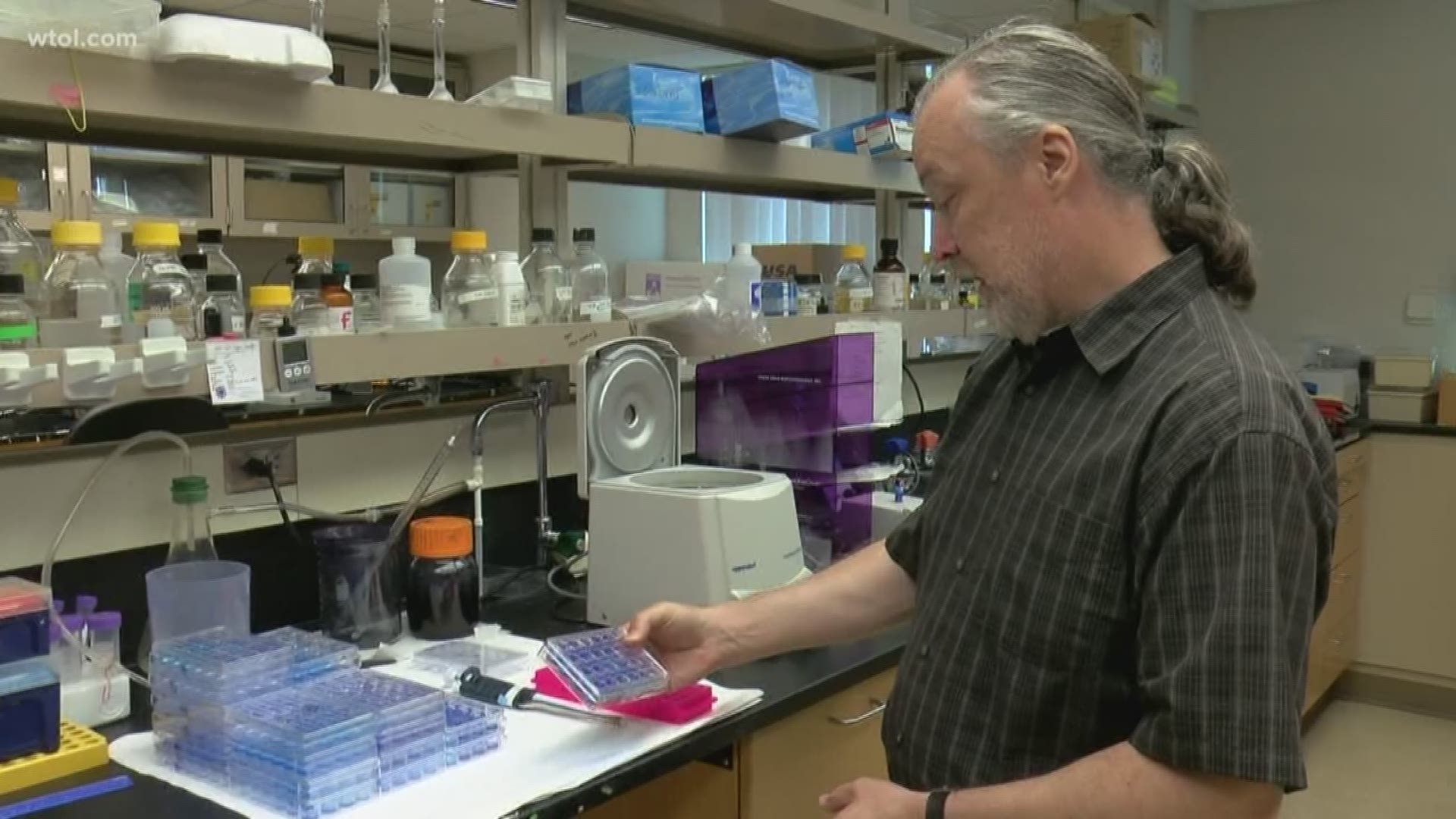Scientists at The University of Toledo investigating improvements to a commonly used chemotherapy drug have discovered an entirely new class of cancer-killing agents that show promise in eradicating cancer stem cells.
Their findings could prove to be a breakthrough in not only treating tumors, but ensuring cancer doesn’t return years later — giving peace of mind to patients that their illness is truly gone.
“Not all cancer cells are the same, even in the same tumor,” said Dr. William Taylor, a professor in the Department of Biological Sciences in the UToledo College of Natural Sciences and Mathematics. “There is a lot of variability and some of the cells, like cancer stem cells, are much nastier. Everyone is trying to figure out how to kill them, and this may be one way to do it.”
Eradicating these cells would not only help many former and current cancer patients all around the world, but some in northwest Ohio as well.
Jackie Cummins helps women being treated for cancer feel a little more like themselves as an employee of the Victory Center in Toledo, but it was her personal experience at the center that pulled her to the job.
"I had surgery and then after surgery, I had chemotherapy and after chemotherapy, I did 25 rounds of radiation," Cummins said.
She was diagnosed with stage three breast cancer in the fall of 2017 and still takes a medication to help prevent the cancer from returning.
"There's always that possibility and it's kind of like, I don't want to say dark cloud, but certainly it's in the back of your mind that even though I did all of this treatment, it could come back," she said.
It's Taylor's and Dr. L.M. Viranga Tillekeratne's ressearch that is giving Cummins new hope.
Tillekeratne is a professor in the Department of Medicinal and Biological Chemistry in the UToledo College of Pharmacy and Pharmaceutical Sciences.
Tillekeratne and Taylor reported their findings in a paper recently published in the journal Scientific Reports. They are investigating a small molecule that locks on to and kills cancer stem cells.
Cancer stem cells are an intriguing target for researchers because of their potential to re-seed tumors.
When doctors remove a tumor surgically or target it with chemotherapy drugs or radiation therapy, the cancer may appear to be gone. However, evidence suggests that a tiny subpopulation of adaptable cancer cells can remain and circulate through the body to seed new metastasis in far-off locations.
Those cancer stem cells, Taylor said, are similar to dandelions in a well-manicured lawn.
“You could chop the plant off, but it will drop a seed. You know the seeds are there, but they’re hiding,” he said. “You pull one weed out and another comes up right after it. Cancers can be like this as well.”
The small molecule they have isolated appears to lock on to those stem cells and kill them by blocking their absorption of an amino acid called cystine.
UToledo was awarded a patent for the discovery late last year.
For Tillekeratne and Taylor, uncovering a new class of therapeutic molecules could prove to be an even larger contribution to cancer research than the project they initially envisioned.
“At present, there are no drugs that can kill cancer stem cells, but people are looking for them,” Tillekeratne said. “A lot of drugs are discovered by serendipity. Sometimes in research if you get unexpected results, you welcome that because it opens up a new line of research. This also shows the beauty of collaboration. I wouldn’t have been able to do this on my own, and [Taylor] wouldn’t have been able to do it on his own.”
Tillekeratne has received a three-year, $449,000 grant from the National Institutes of Health National Cancer Institute to continue testing the effectiveness of the newly identified therapy.
Because the molecules so selectively target cancer stem cells, it’s possible they could ultimately be paired with other chemotherapy drugs to deliver a more comprehensive treatment.
However, the researchers have found their agents show stand-alone promise in treating sarcomas and a subtype of breast cancer known as claudin-low breast cancer, which represents up to 14 percent of all breast cancers and can be particularly difficult to treat.
Although Testing is still in early stages, researchers see promise and Cummins said she is encouraged.
"The possibility that those stem cells could be targeted, and you can eradicate that fear, that possibility of recurrence, is simply amazing," she said.

